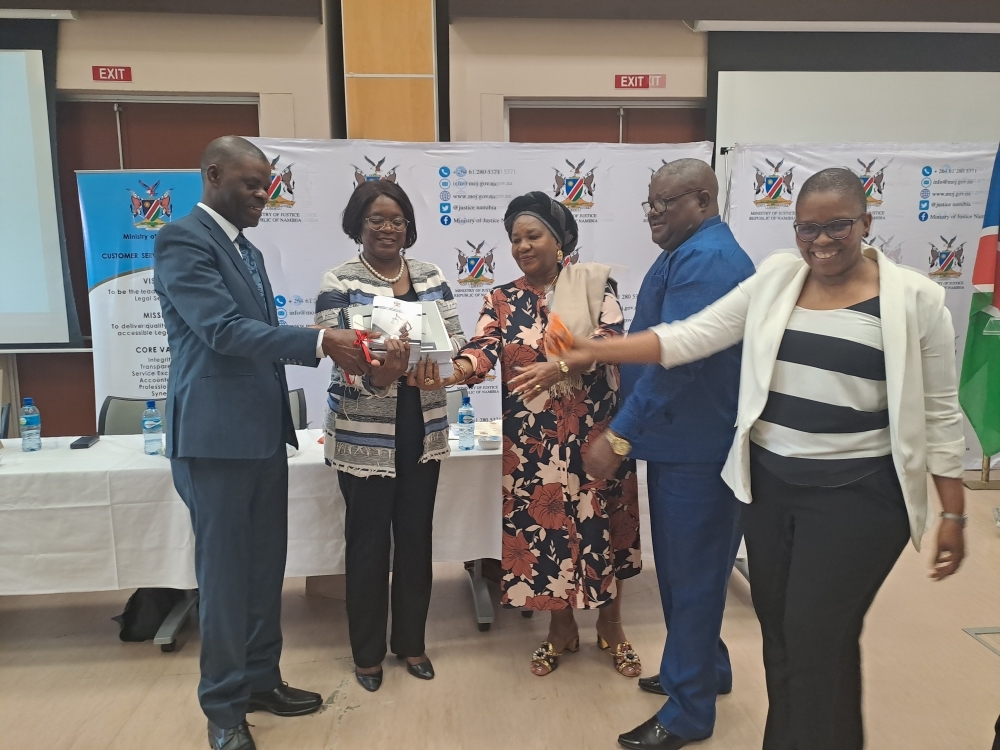Justice ministry launches customer service charters
The justice ministry took a significant step towards uplifting public service standards by launching its institutional customer service charters last week.
These charters, designed to define and improve the quality of service offered, were officially launched at the Namibian Institute of Public Administration and Management (Nipam).
Delivering the keynote address, justice minister Yvonne Dausab highlighted the inherent transformative power of public service and reiterated the ministry's dedication to delivering prompt, supportive, and friendly assistance that holds the potential to positively impact lives.
"The charter defines the transactional norms and standards between a service provider, us as a ministry, and the would-be recipients – the public – of such a service," Dausab said.
Just service
The minister explained that the charters outline the standards of service clients should expect when interacting with the ministry of justice.
“I am happy to note that the ministry of justice is a customer-centred institution, effortlessly striving to continuously improve the quality of our services in line with Namibia's public service vision, which is to delight customers in the provision of quality public services. As a ministry, our vision is to be a 'model provider of legal services and justice for all'.
The minister added: "This essentially suggests that our motto is premised on the philosophy that justice is a service to the public."
Emphasising accessibility, the customer service charters have been meticulously translated into nine local languages, including Braille, an accomplishment in which Dausab expressed pride.
All inclusive
She said this promotes the vision of a society in which "no one should feel left out, including our people with disabilities."
Dausab said it is a constitutional imperative, a promise set out in the preamble of the Namibian constitution, that "all citizens are entitled to liberty, justice, equality, dignity and the pursuit of happiness, and public service is at the centre of this promise."
She underlined that it is her hope that this step will establish a new standard for other governmental bodies to follow, further improving service delivery across the board.
Highlighting recent advancements, Dausab spotlighted the directorate of legal aid's newly introduced electronic system, which streamlines communication with applicants, facilitates efficient application processing, and expedites access to justice.
These charters, designed to define and improve the quality of service offered, were officially launched at the Namibian Institute of Public Administration and Management (Nipam).
Delivering the keynote address, justice minister Yvonne Dausab highlighted the inherent transformative power of public service and reiterated the ministry's dedication to delivering prompt, supportive, and friendly assistance that holds the potential to positively impact lives.
"The charter defines the transactional norms and standards between a service provider, us as a ministry, and the would-be recipients – the public – of such a service," Dausab said.
Just service
The minister explained that the charters outline the standards of service clients should expect when interacting with the ministry of justice.
“I am happy to note that the ministry of justice is a customer-centred institution, effortlessly striving to continuously improve the quality of our services in line with Namibia's public service vision, which is to delight customers in the provision of quality public services. As a ministry, our vision is to be a 'model provider of legal services and justice for all'.
The minister added: "This essentially suggests that our motto is premised on the philosophy that justice is a service to the public."
Emphasising accessibility, the customer service charters have been meticulously translated into nine local languages, including Braille, an accomplishment in which Dausab expressed pride.
All inclusive
She said this promotes the vision of a society in which "no one should feel left out, including our people with disabilities."
Dausab said it is a constitutional imperative, a promise set out in the preamble of the Namibian constitution, that "all citizens are entitled to liberty, justice, equality, dignity and the pursuit of happiness, and public service is at the centre of this promise."
She underlined that it is her hope that this step will establish a new standard for other governmental bodies to follow, further improving service delivery across the board.
Highlighting recent advancements, Dausab spotlighted the directorate of legal aid's newly introduced electronic system, which streamlines communication with applicants, facilitates efficient application processing, and expedites access to justice.




Comments
Namibian Sun
No comments have been left on this article